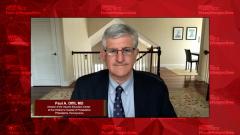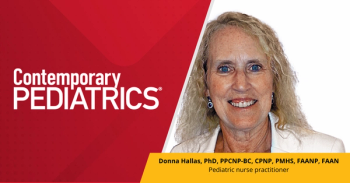
Addressing Vaccine Hesitancy
Vaccine and infectious disease experts address vaccine hesitancy and the importance of the COVID-19 vaccine in children.
Episodes in this series

William J. Muller, MD, PhD: I think 1 of the topics probably most important to delve into and spend some time talking about, are the issues that parents have that raised their concerns about getting their children vaccinated. And I think a lot of us are aware that there’s probably somewhere between 15% and 20% of the population that are lining up to get it for their children. There’s another 25% to 30% that are going to be resistant or reluctant to get vaccinated, but there’s a big portion of the population in between that has this “wait-and-see” attitude. And what sorts of things do you start to tell parents about who may have some hesitation to get their children vaccinated?
Paul A Offit, MD: If you look, the vaccine for the 12- to 15-year-olds was recommended about a year ago, maybe 55% of children in that age group are vaccinated. If you look at the way that happened, there was a spike in vaccination and then it dramatically came down and stayed down. Hence, for those parents who said, “Well, I just want to make sure there’s not a problem, that it’s not a surprising safety problem,” I don’t think that was true. I think there were people who wanted to get it and people who weren’t going to get it, and those who got it, got it early, and those who didn’t want to get it never got it. Six months ago, we had a vaccine available for those who were 5 to 11 years of age, and there was about 30% of parents who chose to vaccinate children in the age group, and 70% didn’t. And again, it was a dramatic spike early, came down, and stayed down. If you look at sort of the surveys that are done by a number of Agencies asking parents, “Do you think you’re going to vaccinate your younger than 5-year-old?”It makes me think that the numbers of parents who are going to be even lower than it was for say, the 5- to 11-year-olds. I’d be surprised actually, if more than 20% of parents of younger than 5-year-olds, have chosen to vaccinate their children. We’ll see how it plays out, but that’s generally the way this has gone. Thus, I’m not sure what pediatricians can do. I think we have to make it clear to parents that this virus can seriously hurt children. I spent a fair amount of time with parent advocacy groups like families fighting flu, meningitis, national Meningitis Angels organization, and those parents all tell the same story, which is “I can’t believe this happened to me” until it happens to them, and then they become vigorous activists to educate about the disease, educate about the vaccine. And you think it’s never going to happen to you, my children surprisingly were fully vaccinated when they were little, I never imagined they would actually get those diseases, but you can’t put children in harm’s way unnecessarily. It’s a game of Russian roulette, and although maybe there’s a 100,000 empty chambers in the gun, there’s no sense putting the gun to the head. It’s just not necessary.
William J. Muller, MD, PhD: I think, and that’s the point we’re probably going to get back to a couple times as we have this discussion, the concept that the anything that you may be concerned about from the vaccine is worse from the actual disease. And I think that might be the important take home message for a lot of people. But maybe we should go through some of the individual objections that some parents bring up. I think one of the common ones, and this came up even before we started to talk about vaccines and children, is that it is the rapidity with which these vaccines were developed. Thus, when people come to us and say, I’m really concerned that this process was rushed, how do you answer that?
Paul A Offit, MD: I think it’s a reasonable concern, this is the fastest vaccine ever made. The virus was isolated in January 2020, we had a vaccine available 11 months later, we did complete it large clinical trials 11 months later. The Operation Warp Speed, which put $11 billion into the effort, essentially took the risk out of it for pharmaceutical companies. We went very quickly from phase 1 trials, which means dose and dose ranging trials to phase 2 trials, where you think you know the dose, and you know that the dosing intervals very quickly to efficacy trials, I can understand that. And thus, the father of modern vaccines was a man named Maurice Hilleman, PhD, who was responsible for either doing the primary research or development on 9 of the 14 vaccines we give to children. And, he said it best when he said, “I never breathe a sigh of relief until the first 3 million doses were out there.” Well, the first 3 billion doses are out there, so I think that that question has been answered. I get the initial reticence. I can understand the initial reticence, but again, there are no risk-free choices, a choice not to get a vaccine is not a risk-free choice, it’s a choice to take a different risk and more serious risks. There are no risk-free choices, it’s to make the choice that puts the child in the safest position possible, to take the least of the lesser risk, and vaccines obviously, are that lesser risk.
William J. Muller, MD, PhD: I think there’s a couple other ways that people can consider approaching this question from parents. The one is that the process actually was the same, it was faster, but it was the same. We went through, like you said, phase 1, phase 2, phase 3, we did dose ranging, we did safety and tolerability, and then we did efficacy studies, all in that order with decreasing age ranges, and this is the way all medical products are developed. And hence, there’s really nothing different about this process, except it was done more quickly. And, the way you do things more quickly, is by spending a lot of money, and that’s what Operation Warp Speed did.
Paul A Offit, MD: I think it’s exactly right. The reason it was fast, is the government took the risk out of the company. The way that companies typically work is they do phase 1 trials, then they do phase 2 trials, then they do phase 3 trials, then if assuming everything works, then they build a building, then they mass produce it, then they submit it for licensure, and then it gets licensed. Here, what the government did, was they said just mass-produced the vaccine at risk, meaning mass-produce it without having done that phase 3 trial, you don’t know yet whether it’s safe, you don’t know whether it’s effective, “We’ll do all that at the same time. We’ll do that efficacy trial, phase three trial while you’re mass producing the vaccine, so that if it shows that it is working it say and so that we can make it immediately available to the public.” No company would never do that, so it really just took the risk out of it. But the size of those trials initially, the Pfizer trial, which was a 40,000-person trial, the Moderna trial was a 30,000-person trial. That’s the size of any typical pediatric or adult vaccine trial, so it really wasn’t skipped. I think, what did confuse people, and it’s understandable at some level was the use of the term emergency use authorization. You had during the Trump administration, we approved through emergency use authorization, hydroxychloroquine, which had never been shown to work, to treat, or prevent this disease, and they approved it. And then, 3 months later, when it was shown to do neither, and, in fact, met at some level dangerous, they went through that emergency use authorization. I think that sort of scared people that this was a very flimsy process, but it really doesn’t apply to vaccines. I wish we had a different term other than emergency use for authorization for vaccines.
William J. Muller, MD, PhD: That’s fair. I understand the rationale of the FDA [US Food and Drug Administration] to try to make a distinction between the authorization and approval, but people are using those terms interchangeably now, and it becomes really confusing, not just for parents and the general public, but also for providers.
Transcript Edited for Clarity
Newsletter
Access practical, evidence-based guidance to support better care for our youngest patients. Join our email list for the latest clinical updates.










